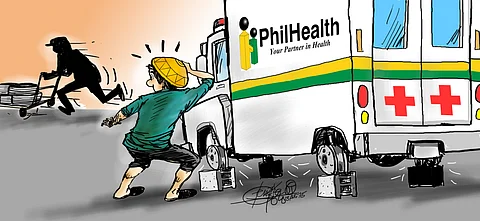
- NEWS
- the EDIT
- COMMENTARY
- BUSINESS
- LIFE
- SHOW
- ACTION
- GLOBAL GOALS
- SNAPS
- DYARYO TIRADA
- MORE

Calls are growing louder to identify and hold accountable the members of the bicameral conference committee who ordered the elimination of the P74-billion subsidy for the Philippine Health Insurance Corp. (PhilHealth) in the 2025 General Appropriations Act (GAA).
Sen. Panfilo Lacson, who is the Senate’s budget watchman, asked why the lawmakers allowed the scrapping of the PhilHealth subsidy “when they knew this was illegal?”
He contended that the GAA, as a general law, cannot amend the Sin Tax Law, a special edict that earmarks funds for PhilHealth.
The realignment of the P74 billion effectively amended the Sin Tax Law, which Lacson said was illegal.
The bicam’s bypassing the principle suggested either negligence or a deliberate disregard of the law, which makes those who undermined the legal framework on PhilHealth’s funding accountable.
By removing the subsidy, the bicam jeopardized the implementation of the UHC Act, potentially leaving millions of Filipinos without adequate health coverage.
Bicam head Senate President Francis Escudero justified the denial of the subsidy as the penalty for PhilHealth’s failure to use its P600-billion reserve fund to benefit its members.
He argued that amassing the reserve fund reflected PhilHealth’s inability to fulfill its mandate of providing zero-balance billing to its members, which forced the Department of Health to create the Medical Assistance to Indigent Patients (MAIP) program to compensate for PhilHealth’s shortcomings.
The MAIP, however, is a tool for political patronage since members of Congress influence its allocation.
The mandates of the Sin Tax Law and the UHC Act stipulate that excess funds should be used to enhance benefits or reduce premiums, rather than offsetting withdrawn subsidies.
Davao City Representative Sid Ungab, a former chairperson of the House appropriations panel, initially raised the breach, citing the Sin Tax law’s mandate that says portions of revenues from tobacco and liquor be earmarked for PhilHealth to fund health care services under the UHC.
“The law is obvious in requiring their earmarking for PhilHealth,” he said.
Under the provisions of the law, the fund should be automatically and regularly provided to PhilHealth. The zero allocation to Ungab represented a failure to comply with both the Sin Tax and UHC laws. Worse, the defunding eliminated the possibility of restoring the subsidy in this year’s budget, even through a supplement.
“It is particularly troubling that even a token one-peso budget could have saved PhilHealth’s legal standing for augmentation. Instead, the complete absence of an allocation effectively prevented any possibility of a funding restoration,” Ungab pointed out.
Despite Escudero’s and Senate finance panel chairperson Grace Poe’s vigorous defense of PhilHealth’s defunding, the opaque nature of the bicam’s decision-making process hid the culprit of the illegal act.
As vice chairperson of the Senate committee on finance and chairperson of the Senate committee on health, Bong Go had condemned the subsidy cut, emphasizing the need to protect Filipinos’ health and ensure the proper use of public funds.
The bicam’s members may face scrutiny from their peers, a humiliation they deserve for their callousness over the sad plight of Filipinos who avoid hospitals because they are poor.
